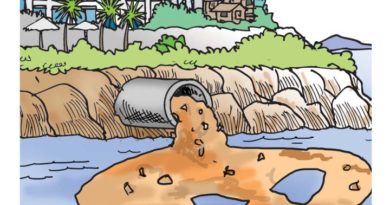OP-ED: SG- Green v growth: Beijing weighs the price | BANGKOK POST- Finding ‘Billy’ just the start
.

Thailand has long been notorious for letting numerous mysterious cases of extrajudicial killings, torture or forced disappearances go unresolved, and harbouring a culture of impunity among the state actors allegedly involved.
A rare exception seemed to emerge yesterday when one mysterious forced disappearance case was partially solved. The Department of Special Investigation (DSI) confirmed that Karen rights activist Porlajee “Billy” Rakchongcharoen, who went missing after being held in state custody more than five years ago, was tortured and murdered.
But whether or not the revelation will lead to justice for Porlajee is another story.
On April 17, 2014, Porlajee was last seen while in the custody of Kaeng Krachan National Park officials who arrested him for “collecting wild honey”. He never returned home.
At the time of his arrest, he was helping members of the Karen ethnic group sue Chaiwat Limlikit-aksorn, the national park’s former chief, for setting fire to their homes and rice barns. Even though his family brought the case against Mr Chaiwat and other officials to court, they were acquitted of involvement in the disappearance due to a lack of evidence.
It was believed he had become another victim of a forced disappearance.
In June last year, the DSI took up the case for investigation and teamed up with officials from other agencies as well as academics.
At a press conference yesterday, executives from these agencies revealed the findings of their investigation. A piece of burnt skull was found in an oil barrel in the reservoir of the Kaeng Krachan dam in Phetchaburi province. DNA taken from the fragment matched that of Porlajee’s mother. Divers also found 20 more bone fragments, eight of which were human. An investigation into these bones is still underway.
The DSI concluded that the crime was a torture- murder.
The findings lend hope to some that the perpetra-tor(s) will eventually be brought to justice given the strong evidence. Importantly, the location where the bones were found is a closed area where public access is strictly controlled. The DSI can now focus its probe on this part of the park and any relevant logs or records.
But others may have reason to doubt that the case may ever be concluded given the country’s low conviction rate in many numerous cases of extra-judicial killings, suspected torture and forced disappearances allegedly involving state officials.
ADS by Cloud 9:
.
– SPACE RESERVE FOR YOUR ADVERTISEMENT –

The team of investigators from the DSI and other agencies deserve a round of applause for their work and they need support in their next efforts to seek justice for Porlajee and his family. There must not be any form of “outside influence” or meddling in this due process that could hinder their efforts.
This revelations in the Porlajee case only emphasise the need for the mystery behind other similar cases to be solved and for perpetrators to be brought to justice.
Among them are the 2016 disappearance of grassroots land rights activist Den Khamlae who campaigned against the state’s effort to evict forest dwellers; the extra-judicial killing in broad daylight of Lahu activist Chaiyaphum Pasae by a soldier at a checkpoint in Chiang Mai in March 2017; and the mystery surrounding the death of insurgent suspect Abdulloh Esormusor after being held in military detention in late July this year.
These and other victims are still waiting for justice to be served. And so is Porlajee.
EDITORIAL
BANGKOK POST EDITORIAL COLUMN
ADS by Cloud 9:
.
– SPACE RESERVE FOR YOUR ADVERTISEMENT –

COLUMN-OPINION
The Straits Times
Green v growth: Beijing weighs the price
TOP STORIES
The tension between China’s slowdown and its climate ambitions has global implications
Until a few years ago, business was good even if the air was bad in Dazhang village, a town deep in the Baiyangdian wetlands of northern China that has long prospered from one main industry: processing duck feathers for use in clothes and pillows.
Residents had access to water from the marshes and cheap coal to fuel rudimentary boilers. Luxury cars threaded through rutted streets.
TO READ THE FULL ARTICLE: https://www.straitstimes.com/opinion/green-v-growth-beijing-weighs-the-price










